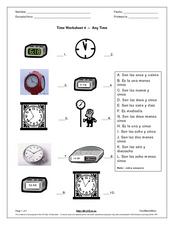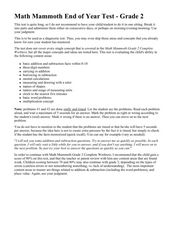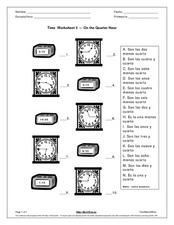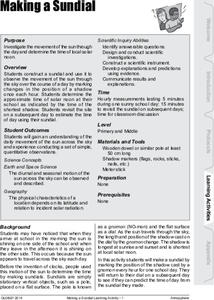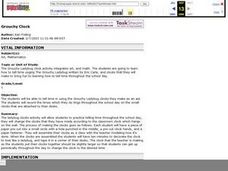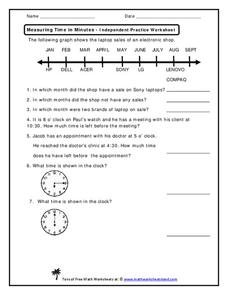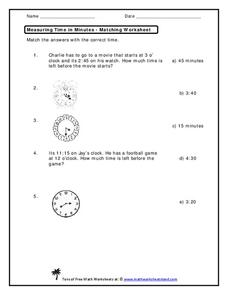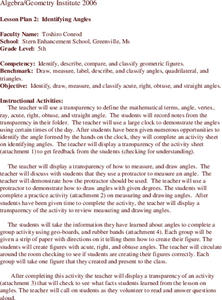Curated OER
Time Worksheet- Any Time
Assess your scholars on their ability to tell time in Spanish. They'll match both digital and analog clocks with the correct, written-out time. Consider adding some of your own analog and digital clocks and having learners write the...
Curated OER
Digital Time Capsule
Students discover ways to pass on stories to future generations by creating a time capsule. For this history preservation lesson, students utilize a digital camera/camcorder to record their daily lives which is turned into a compact...
Curated OER
Math Mammoth End of Year Test - Grade 2
Assess your second graders with this end of the year test. Originally meant for home school, this assessment could also be used in a larger setting. Learners complete 35 problems based on their knowledge of the second grade math...
Curated OER
Time Worksheet 2-On the Half Hour
Have your learners recently been introduced to telling time in Spanish? This worksheet provides an extremely quick review of half-hour time increments. It features both digital and analog time clocks, which is great practice!
Curated OER
Time Worksheet 3-On the Quarter Hour
Build your Spanish learners' confidence in telling time with this instructional activity. Digital and analog clock illustrations are provided, and learners must match the correct time to each clock illustration.
Curated OER
Time Worksheet- On the hour
If your Spanish speakers are learning how to tell time in Spanish, this should probably be one of the first worksheets you give them! Digital and analog clock illustrations are provided for your beginning learners. They identify the time...
Curated OER
Get Charged!
Learners explore the concept of electricity in this activity based unit. In this physical science instructional activity, students focus on electricity and electrical engineering. The teaching unit includes 5 activities to develop...
Curated OER
Time Worksheet-on the Hour
Use this as an introduction to telling time in Spanish. Your beginning Spanish speakers match 10 digital and analog clocks with the Spanish time expression. Include some oral practice through call-and-response to reinforce the new...
Curated OER
Learning 8 - Write the Word
Two, four, six, eight! Youngsters focus on the number eight, starting with spelling its word form. First, they trace it and then print it once on their own. Next, scholars incorporate counting forward and backward by filling in numbers...
Curated OER
Lollipop
This line dance incorporates the grapevine, step-claps, the Twist, and the Lindy step. It's a great way to introduce the Lindy step in a line dance before teaching them to dance the Lindy with a partner. The directions are well written...
Kindergarten Kindergarten
Living and Non-Living Sort
What do an ice cream cone, bicycle, and alarm clock all have in common? That's exactly what young scientists will find out as sort these pictures and learn about the differences between living and non-living things.
Weebly
¿Qué hora es?
While you may not be able to keep the learners in your Spanish class from looking at the clock, you can help them to read it accurately with a presentation about telling time. From la mañana to mediodía to medianoche, the slideshow...
101 Questions
Pedestrian Countdown
You won't find yourself racing the clock on such a great task. Scholars use video information to predict the time left on a crosswalk signal after a pedestrian crosses. The video shows the time left on the counter, and individuals must...
Seterra
Northern Europe: Countries - Map Quiz Game
Remembering geography is a tiring and tedious task to many scholars. Change it up by assigning the map quiz game. Elementary and middle schoolers alike test their knowledge and compete with the clock to match as many countries as...
iCivics
We The Jury
A jury must decide: are the names of two businesses so similar that one is hurt by customer confusion? Learners play the role of a juror who must decide—and convince others—whether Trio Taco and Trio Pizza are too similar. Using...
Utah Education Network (UEN)
Utah Open Textbook: 8th Grade Science
The cycle of energy is important to many different systems on Earth. Scholars use questioning and observation to investigate the differences between renewable and non-renewable resources and how they relate to global changes. They...
GLOBE Program
Making a Sundial
Sundials are more than just primitive clocks. Learners build their own sundials to study the location of the sun across the sky throughout the day. They use shadow evidence related to their sundials to make conclusions about solar movement.
Curated OER
What Time is It?
For this vocabulary and reading comprehension worksheet, students read a 1 page selection about clocks, label a drawing with 6 terms, and respond to 11 short answer and fill in the blank questions.
Curated OER
Grouchy Ladybug
First graders are going to learn how to tell time using The Grouchy Ladybug written by Eric Carle, and clocks that they will make to bring fun to learning how to tell time throughout the school day.
Curated OER
Measuring Time in Minutes
Time is measured in both months and minutes; scholars first examine a line graph to see in which months an electronic shop had sales on specific laptop brands. They answer three questions about the data. Then, they determine how much...
Curated OER
Measuring Time in Minutes
Telling time is all about practical application; use these real-life scenarios (with a few analog clocks thrown in) to help scholars place this skill into a useful context. They read two word problems to determine how much time each...
Curated OER
Identifying Angles
Students identify names of angles. They use a large clock to demonstrate angles using certain times of day. Given a geoboard, students create figures with acute, right, and obtuse angles.
Franklin College
Tell Time to the Nearest Half-hour and Relate to Events
Youngsters examine how to tell time to the nearest half-hour. They discuss why people wear watches, listen to the book "What Time Is It?" by Sheila Keenan, view examples on a model clock, and complete a worksheet with the teacher.
Curated OER
Toothpick Tops
Students assembly tops and name them 1 - 12 so that they can compare their results. They guess which top they think will spin the best and then record data on "Toothpick Top" table. Using a stopwatch or clock to measure and record the...
Other popular searches
- Time Clocks
- Telling Time Clocks
- Digital Clocks
- Biological/internal Clocks
- Calendars and Clocks
- Time and Clocks
- Time, Clocks
- Types of Clocks
- Reading Clocks
- Base 10 Clocks
- Blank Clocks
- Analog and Digital Time


